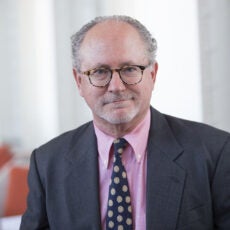
Philadelphia Oil Refinery Explosion is a Learning Moment
With participation from the University of Pennsylvania, Mayor Kenney's advisory group gathers to discuss the future of the closed Philadelphia refinery.
This article was first published in The Daily Pennsylvanian on July 21, 2019. It is republished with their permission.
On the early morning of June 21, the PES refinery and surrounding neighborhoods were rocked by two explosions and resulting fires that appeared to be related to a leak in Unit 433, which is a particular kind of alkylation unit that uses hydrofluoric acid to catalyze part of the process of refining petroleum into gasoline products. Five days later, with the site still being monitored and the incident under multiple investigations, PES announced that the refinery would be shutdown and put up for sale.
On the early evening of July 16, an advisory group convened by Mayor Kenney met for the first time with the mandate to “better inform how the City approaches the future use of the site” and “organiz[e] a series of listening sessions … for people to express their thoughts, concerns, and ideas with respect to the site.” As a measure of this matter’s importance, all twenty people who were invited to serve on the advisory group showed up on three days’ notice for that first meeting.
As a member of this new group, I am writing this op-ed as an early step toward fulfilling my mandate. Let me explain what I mean by this. And for the sake of brevity, please forgive me as I set aside the polite conventions of modesty and begin that explanation by bluntly stating why I’m on this advisory group.
I’ve taught at Penn since 1999. But that is not the role in which I’m recognized by the Philadelphians who know me.
Most people think of me as an acerbic opinion leader through my newspaper columns and/or an ambitious policy entrepreneur inside and outside of government. (For a glimpse into what it’s like to be a public intellectual in Philadelphia, read this from a dozen years ago.)
As I sat and listened to each member of the new advisory group introduce themselves and state their thoughts on the future of the PES refinery and site, I marveled at the clarity of the interest they represent and at the power of that clarity to animate their stated positions. Children sent to college because of family-supporting jobs, social networks established over generations of place attachment, the costs and fears of exposure to toxins on the other side of a tall fence … all of these singular interests elevate the positions based on them. (I’m also privileged to be getting a powerful reminder of the problems of representation, as these interests and claims collide in ways that are difficult to reconcile … but that’s another column.)
I don’t have a singular interest to represent in this process. Everyone knows that, and it’s not why I’m on the advisory group.
But I admit to wanting a community as I find myself working with people who are largely defined by where they come from. That’s why I’m writing this op-ed.
This great university’s students, staff, and faculty “contain multitudes” and could, in many, many ways, better inform the City’s approach to the future of the PES site. I in no way represent Penn itself. But I would like to represent Penn’s multitudes by facilitating the Penn community’s potential contributions to the advisory group’s mission.
Penn is full of people with meaningful and helpful things to say to decision makers. I invite anyone who would like to contribute to the public hearings being planned to contact me. I do not control the speaking list, but my mandate is to identify people who have things to say that the City should hear. As other members of the advisory group advocate for voices from their communities, I feel a responsibility to do so with mine in the most transparent and inclusive way I know.
Mark Alan Hughes
Director EmeritusMark Alan Hughes is director emeritus of the Kleinman Center. During his time as faculty director, he led the Center and wrote on topics ranging from deep decarbonization to the future of Philadelphia’s energy landscape.

